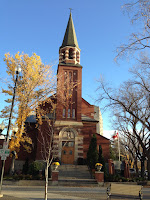I didn't use a text for my homily today, so can't post it. But what I said was fairly simple: we shouldn't be overly concerned with how long we spend in prayer--regularity and frequency trump duration, since God can do wonders even in short periods of contact.Too much focus on the length of time we pray can lead us to forget that God is almighty and can achieve His purposes in His own time.
We find an excellent example of this in today's Gospel reading. Bartimaeus prays "Son of David, have mercy on me," twice, then adds his petition "My teacher, let me see again." Start to finish, I timed his prayer as taking fourteen seconds! But look at the result: "Immediately the man regained his sight and followed Jesus on the way."
To show such prayer is practical, I offer some examples of ways to pray that are brief but powerful:
Less than a minute
The Jesus Prayer: “Lord, Jesus Christ, have mercy on me.” (Or
“Lord Jesus Christ, have mercy on me, a sinner.”)
Divine Mercy Invocation: “Jesus, I trust in you.”
Aspirations to the Sacred Heart: “Sacred Heart of
Jesus, have mercy on me.” (Or “on us.) “Sacred Heart of Jesus, protect our families.”
A minute and a half
The Angelus (traditionally said morning, noon, and
night):
V. The Angel of the Lord declared unto Mary. R. And she conceived of the Holy Spirit.
Hail Mary…
V. Behold the handmaid of the Lord. R. Be it done unto me according to thy word.
Hail Mary…
V. And the Word was made Flesh. R. And dwelt among us.
Hail Mary…
V. Pray for us, O holy Mother of God.
R. That we may be made worthy of the promises of
Christ.
Let us pray: Pour
forth, we beseech Thee, O Lord, Thy grace into our hearts, that we to whom the
Incarnation of Christ Thy Son was made known by the message of an angel, may by
His Passion and Cross be brought to the glory of His Resurrection. Through the
same Christ Our Lord. Amen.
Two Minutes
Many brief versions of the Examen Prayer of St.
Ignatius of Loyola can be found on-line. At its simplest:
Place
yourself in the presence of God, and ask for his help in looking back on the
day.
Examine your
day with three “words:”
Thank
you:
Thank the Lord for the blessings of the day.
I'm
sorry: Acknowledge your faults specifically and directly.
Please
help me more: Ask the Lord for help for tomorrow. Make specific
resolutions.
Three Minutes
The
Three-Minute Retreat: online at http://www.loyolapress.com/3-minute-retreats-daily-online-prayer.htm
or download the app for Apple or Android at http://www.loyolapress.com/3minute-retreats-mobile-app.htm
Five Minutes
Open your bible and read from the New Testament for
five minutes, stopping twice to talk with God. Or Read one of the Mass readings
from your misallette or on-line, “responding” to the text with the responsorial
psalm.
Ten Minutes
Treasure
in Heaven: A 40-day, ten minutes a day prayer guide. You can print it out, order a booklet by mail
from the Companions of the Cross or download to your smartphone, tablet or
e-reader at http://www.companionscross.org/sites/default/files/TreasureinHeaven_PrayerGuide.pdf
And let’s not forget traditional daily prayers like the Morning Offering, Grace
before and after meals, and the simplest of all, an Our Father, Hail Mary and
Glory be at bedtime…








